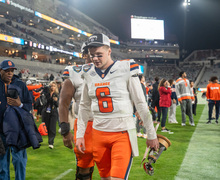Freshman Kendall Coleman thrust into focal role in Syracuse defense
Jes Sheldon | Photo Editor
Kendall Coleman tallied four tackles in the Orange's season-opening win over Colgate.
Kendall Coleman knew he would be a target. He’s the freshman, a newbie on a line full of inexperienced players. So as Colgate quarterback Jake Melville turned and faked a handoff, Coleman crashed down on the offensive line.
Then, on his first snap as a college football player, he froze.
“Right after the first play (I knew I had to relax),” Coleman said. “Before the game, I knew they were going to attack the freshman.”
By virtue of his youth, Coleman has turned into one of Syracuse’s (1-1, 0-1 Atlantic Coast) most important defensive players. He’s the end teams will run at this season because of the transition he’s had to make from high school football to Division I football. He had to do so without the ability to work on his upper body after tearing his labrum during his senior season in 2015.
Even Coleman didn’t expect to be starting so soon in his career. Coming into Syracuse’s matchup against South Florida (2-0) at 3:30 p.m. in the Carrier Dome, Coleman has five tackles, the most of any SU defensive lineman. On Saturday, he’ll be a key again because, just like Louisville, USF runs read option.
“He’s going to be a good player,” Babers said. “Now, at 18, is he going to be able to handle all these 21- and 22- and 23-year olds? He probably has some growing up to do. But after he goes through a year, year-and-a-half, I think we’re going to have a good player.”
In a game on Oct. 2, 2015, against Fishers (Indiana) High School, Coleman’s Cathedral (Indiana) High School was well on its way to a 35-6 blowout win. Before his coaches could pull him, Coleman was hit in the back.
“Kendall’s arm just slumped. It kind of fell down,” Nikki Coleman, Kendall’s mother, said. “… I just recall Kendall running off the field like Napoleon Dynamite.”
Coleman had complained about shoulder pain for two years. He had gone to the trainer, who told him repeatedly he just had a pulled muscle. Coleman used ice to treat it and the pain would come and go for those two years.
What he had, however, was really a partially torn labrum. The hit against Fishers fully tore it. Instead of immediately getting surgery, Coleman sat out two weeks and played in the playoffs with a brace on the shoulder. Only then did he get surgery.
Between last football season and the current one, Coleman trained his lower body when he couldn’t lift weights. His parents set him up with a personal trainer, who he worked out with 3-5 days each week.
At Cathedral, Coleman didn’t have to switch which hand he used for his stance, so the injury only hurt his non-stance shoulder. When he got to SU, the coaches had the defensive ends switching stances and sides of the line, so he had to use the shoulder he injured. By the third day of training camp, though, Coleman said he was already working in with the first team.
“The week before I had gotten here, I was just cleared to play full contact,” Coleman said. “… I had no clue what was in store for me.”
On his first play, Coleman’s pause was costly. He bit on Melville’s fake, letting the Colgate quarterback run outside. Coleman pivoted, chased for a few yards and dove for a tackle he couldn’t make.
“It was a read option and I was supposed to get up the field,” Coleman said.
He admitted the game moved a bit faster against Louisville. The Cardinals pushed a pace he wasn’t used to.
Nine years ago, Coleman tried out for the Pike Junior Red Devils as a fourth grader. The team was comprised of fourth, fifth and sixth graders. Despite being one of the younger players, he made the team. When he showed up to the first practice, Coleman surveyed the field and the kids running tackling drills.
“Are you OK?” Nikki Coleman asked her son.
“Mom, I don’t want to do this, I just want to go home,” Coleman responded.
“Kendall, I can’t take you home. I’ve already registered you,” she replied. “You have to stay.”
At the end of the season, Coleman became a captain and one of the team’s best players.
Instead of fifth and sixth graders, Coleman is competing with juniors and seniors now. He was never expected to be a freshman starter in a position that doesn’t see as many of those.
But what the Orange needs is the same thing he displayed with that team — to succeed in a position he may be too young for and grow enough to hold his own against older players and then some.
Published on September 16, 2016 at 1:41 am
Contact Chris: cjlibona@syr.edu | @ChrisLibonati





